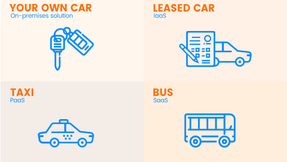Platform as a Service (PaaS), is a cloud computing class, wherein a PaaS provider offers a platform that lets customers develop, operate and manage applications with no need to maintain the infrastructure related to the development and launch of the app. Platform as a Service in cloud computing proves to be successful especially for those in IT industry – both customers and sellers. The PaaS model is adopted by small scale businesses for designing and selling their own software and like cloud business models, this also is a profit oriented one. It has been anticipated that by 2026, the revenue of the suppliers providing PAAS in the cloud industry would reach a value of more than $68 billion.
PaaS Easing the Complexity
PaaS brings a tension-free method to install internal hardware and software to design or operate a novel application. It does not substitute the whole infrastructure of the business. Rather, a business leverages on PaaS providers for different key services, like Java development and application hosting.
For instance, if a business is using a local business tool, then it has to purchase and deploy OS, hardware, middleware (like databases, web servers etc.), define security or access level to the user, and then integrate the new application to current performance monitoring (APM) tools. It’s not done, a business needs to maintain all of the resources with time.
To start exploiting the PAAS platform, users just need to log in on a web browser interface.
PaaS brings the following benefits to the businesses in general.
· Accelerates time to market.
· Enhance capability to respond to opportunities and changes
· As no upfront investment required, a business may spread the capital investments more and surpass the competition.
Pay As-You-Go Approach
Users just pay for the services they used, so the wastage of the resources is significantly avoided. Pay-as-you-go approach lets users to be charged just for what they use. There are PaaS providers who charge only monthly fee to give an access to the platform and their apps. It is significant to discuss pricing prior to engaging the services.
Speed, Agility & Flexibility
PaaS offers better flexibility, agility and speed to the app development process. By giving a foreseeable, application infrastructure, businesses don’t get bogged down with the enabling applications and successfully cater their customers’ needs.
Performance & Scalability
You can scale cloud any time to meet your demanding IT requirements. Regarding performance, it is a responsibility of the PaaS provider’s to make sure that customers’ services are working without any obstacle and, also to deliver them with an easy access their resources through dashboards for more enhanced performance.
PaaS platforms let businesses focus on code, and not management, so they can easily develop, test, and run applications without the complexity of IT tasks or waiting for months to get servers prepared for writing code. It also works best in a remote collaborative environment. Thus, advantages of PAAS cloud computing make IT a lot easier.


